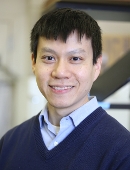Biography
Specialties
Neurology
Neurology
Research Topics
Blood-Brain Barrier, Brain Imaging, Chemokines, Cytokines, Demyelination, Immunology, Multiple Sclerosis, Neuro-degeneration/protection, Neurobiology, Neurology, Neuroscience
Blood-Brain Barrier, Brain Imaging, Chemokines, Cytokines, Demyelination, Immunology, Multiple Sclerosis, Neuro-degeneration/protection, Neurobiology, Neurology, Neuroscience
Multi-Disciplinary Training Area
Neuroscience [NEU]
Neuroscience [NEU]
